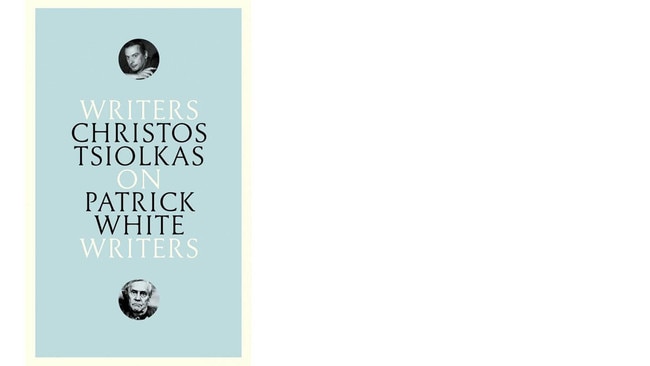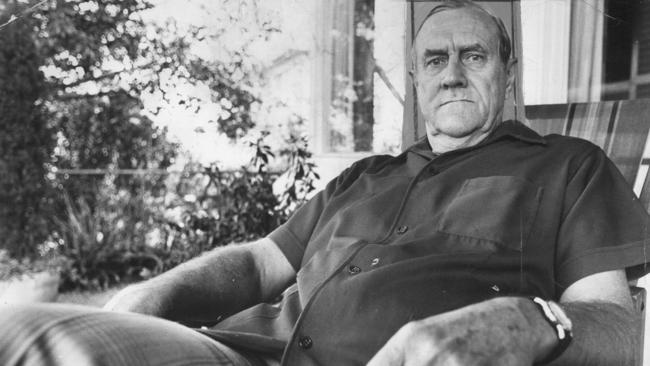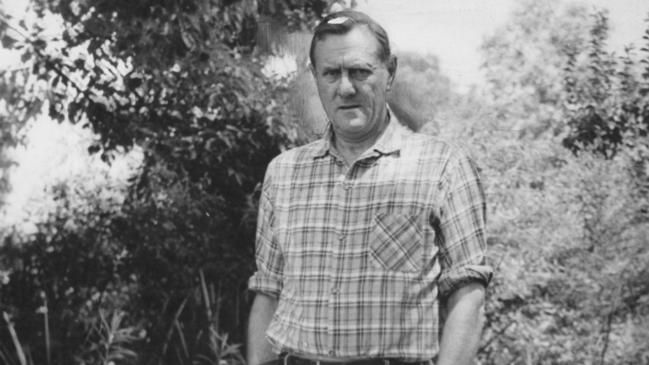Review: On Patrick White by Christos Tsiolkas
Tsiolkas recalls an enduring truth: Patrick White is a prophet without honour in his own country and among his own kin.

It is the intensity of assertion that gives the game away — those sinews straining to lift the subject into the light of our good graces. Christos Tsiolkas’s long essay on Patrick White, the third in Black Inc’s welcome Writers on Writers imprint, is a spirited swoon of an undertaking. It works hard to remind us that the novels, short stories, plays and memoir White left behind constitute a priceless cultural patrimony.
But in doing so Tsiolkas also recalls us to an enduring truth: White is a prophet without honour in his own country and among his own kin. The two Miles Franklin awards, the Nobel Prize in Literature, the knighthood (declined), Australian of the Year award, the memorial lawn that runs down from the National Library to Lake Burley Griffin — every laurel laid upon the author’s brow still feels like official cover for incomprehension, general indifference, even outright hostility.
This situation is unfair but not inexplicable, since White’s life and work is situated at a social, political and cultural crossroads in our nation’s self-conception. To some scholars of literature in Australia across past decades, White was an exemplar of the white male school of literary nationalism that they sought to question and critique. For readers habituated to the realism, whether “dirty” or “magical”, and the modernism-lite of the Booker prize era in fiction, White’s gnarled baroque style and agonised existentialism seemed grotesque, dated and over the top.
To the genteel and moneyed, he was a class traitor who railed against the Business Dreaming of the elite and the squattocratic mores of his forebears. To the masculine mainstream who adore a sporting or military hero, he was homosexual and therefore suspect. To the young, he was old; to the old, well, they were the Australians he had grown up alongside and spent a lifetime flaying with his satire, beating with his stone tablets. Nor did it help that White was easy to dislike: constitutionally reticent, prickly, patrician; one of those colonial interzone types, born and educated in Britain.

So, it is a stroke of genius that this difficult artist and divisive individual should have been paired with Tsiolkas. Tsiolkas has credibility in the areas White is deficient. He is direct, personable, street-smart; his own fictions can be slangy and raw, gleefully and deliberately transgressive. He, like White, has been a scourge of shallow materialism and hard-coded racism, misogyny and homophobia in the Australian context. But, unlike the earlier writer, Tsiolkas is the gay son of working-class Greek migrants. He speaks for antipodean outsiders with a legitimacy White could never claim.
Tsiolkas is also a fearless scrapper, so when he wades into the long debate about White’s merits and demerits, you may expect him to bring a big stick. But this is not the case. What he has written instead is a love letter. Though it is not an uncritical one, since Tsiolkas is a careful literary craftsman, it is written in the shadow of a whole year given over to reading White’s work. What readers get is an account of Tsiolkas being unmoored and ennobled by the experience of doing so.
This meditation on fandom does not end in admiration, however; it sets out from there. Because the radical gesture of the book is its insistence that White lays down a challenge to all of us: as writers, as readers, as Australians, as individuals, to appreciate that “there are novels that in the reading enact a transformation that sees their characters and language become part of oneself, that literally change the way you look upon the world … reading a great writer is a challenge because it always makes you want to better yourself.” If we could just stop looking at him with the old blinkers on, Tsiolkas suggests, we might open ourselves to more potent, compelling vision of the author and his art.
The book opens with a question shouted from a stranger in a crowd at a British writers’ festival: “Christos, what do Australians think of Patrick White these days?” Tsiolkas, who has spent the event in a crouched, defensive position regarding his Australianness, feels free for the first time to simply avow White’s enduring merits as an author. This is not an automatic reach for the nearest canonical figure; it is a sincere reflex. He has just finished reading White’s 1957 novel The Tree of Man and has been powerfully affected by it. What follows is an extended gloss on that automatic affirmation. Yet Tsiolkas doesn’t pull out the usual stops in doing so. Instead he starts out by making the startling claim that White’s work is profoundly informed by the Greek Orthodox beliefs of his lifelong partner, Manoly Lascaris:
Greek Orthodoxy’s history, separated by schism and Empire from Western Europe, surviving for half a millennium in a largely Muslim world, is characterised by mysteries that exhort the unknowability of God. Cleaved from earthly power with the conquest of Constantinople by the Ottomans, Orthodoxy is marked by a fatal- ism that separates it from both Catholicism and Protestantism. Orthodoxy’s lore reifies the seer, the hermit and the seeker, those who abandon earthly pleasures to and God’s immanence in the natural world. Orthodoxy eschews the intellectual quest for God.

Tsiolkas doesn’t mean to say White was impelled by specific religious belief. Rather, it was the sensibility he borrowed and embraced: that some strange and special souls are destined to cast off from ordinary shores and sail into mystical waters. These are the Elect in White’s fiction — the Alf Dubbos and the Johann Ulrich Voss’s and the Theodora Goodmans — those whose oddity and estrangement from the conventional world is their grace.
That Tsiolkas should rope in Lascaris here is telling, and of a piece with his larger thesis. He makes the case — a convincing one — that White’s love and affection for his partner bled into the works he produced: that indeed (and while the aristocratic Manoly would loath the appellation) White was an honorary wog.
Certainly his sexuality, which rubbed against the grain of all that was acceptable in mid-century Australia, made White acutely conscious of the ways people might operate outside the normative bounds of a society and, even, delight in the fact they do.
Tsiolkas’s reading of The Tree of Man — the first of three great novels he regards White to have produced — extends this idea of outsiderdom. In the figures of Stan and Amy Parker, their long and slow incorporation into antipodean space, as that space itself is absorbed into an encroaching suburban milieu, White ventures an adaptation of the Eden myth, one that he then bends and breaks for his own inscrutable yet miraculous ends:

Its meaning and force are not to be found in its being some kind of Urtext of Australian history, but in being one of the first great novels to be written about the migrant experience in the English language. That Amy and Stan Parker are not immigrants as we now define them doesn’t mitigate the immense accomplishment of the novel.
Here Tsiolkas is at his most glowing and direct. He loves the book as a universal classic, eluding temporal or geographic boundaries, as a classic should, but he is similarly determined to locate the book within a distinct history of the Australian self as it unfurls in local space:
I believe one of White’s achievements is to link the pioneer experience of White Australia to the general history of migration to this country. To be sure, the specifically British colonial history of Australia means that we understand the “settler” to be English-speaking while the “migrant” is from a non-English-speaking background, but what is revelatory for me as a reader of The Tree of Man is that the “Englishness” of Stan and Amy is inconsequential. It is precisely this imaginative and therefore historic leap taken by White that means I read the book as the first great migrant story in our literary culture.
The paradox of this wonderfully counterintuitive reading — of White as determined outsider, attuned to the ontological frequency of the new arrival Down Under — is that White was a cosmopolitan by birth and inclination. David Marr has written persuasively of White as a London author (the city, besides Sydney, for which he felt greatest affection), yet Tsiolkas is intrigued to note that the author, following his youthful sojourns overseas, resolved himself into a furious, divided, critical, loving and lasting Australian residence. In this, White made himself an exile from his own impulses. Tsiolkas is hardly the first to reckon with the perversity of this decision — long residence at semirural Castle Hill, breeding schnauzers and growing veg; later years at the more salubrious edges of Sydney’s Centennial Park — but he is the most adamant in granting White points for doing so:
I am not contending that White’s greatness as a writer was conditional on his remaining in Australia but rather that it was conditioned by it. White’s talents were liberated by the themes made possible to him as an intellectual and an artist in this country, resulting in a formal sensuousness and flourish. His example gives an ironic twist to our understanding of the “cultural cringe”, a phenomenon he himself helped to define: it may well be that the writer from a colonial space faces greater danger in becoming an expatriate than in staying home.
To which the engaged reader can only nod and ponder the fate of figures, such as Christina Stead, White’s great colleague and competitor, who tested Tsiolkas’s thesis with decades of her life.
This is not a book to swell the footnotes of academics on the make. Nor is it an exhaustive account of the works that made White a figure deserving of attention in the first place. Rather, it is a deeply personal and heartfelt account of one writer’s sense of awe and reverence in the presence of a great predecessor. One might wish it longer — the truncated nature of the enterprise means too much literary ground is traversed too breathlessly — but no one would wish it less urgently impassioned.
Tsiolkas wants us to know he has been altered ineluctably by reading White. He also wishes to commend those works — principally The Tree of Man, The Solid Mandala and The Eye of the Storm — which he believes to be transcendent. Those who love White might furnish three other novels entirely, or else mention short stories, or even the plays that were so long ignored, but the point remains that the most significant thing about White is the enthusiasm void that exists between achievement and collective admiration. This slender, partial, feisty and gloriously tender book does much to close that gap.
Geordie Williamson is The Australian’s chief literary critic. Christos Tsiolkas will discuss his book on Patrick White at the Sydney Writers Festival, which starts on Monday. swf.org.au
On Patrick White
By Christos Tsiolkas
Black Inc, 96pp, $17.99 (HB)



